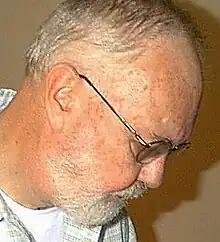William H. Heard (biologist)
William Henry Heard (born 1935 in Michigan) is a malacologist, and an authority on freshwater mollusks, especially freshwater pelecypods (clams). He is an emeritus professor in the Department of Biological Sciences, at Florida State University.[1]

William H. Heard in 2002.
Heard was the winner of the "Lifetime Achievement Award" for 2001 from the Freshwater Mollusk Conservation Society.[2] He has had two species of mayflies named in his honor: Symbiocloeon heardi Müller-Liebenau[3] and Povilla heardi Hubbard.[4] Heard discovered these insects in Thailand, where they were living within the shells of freshwater clams.
Selected publications
- Comparative life histories of North American pill clams (Sphaeriidae: Pisidium). 1965. Malacologia, 2: 381-411
- Recent Eupera (Pelecypoda; Sphaeriidae) in the United States. 1965. Amer. Midland Nat. 74(2): 309-317
- A re-evaluation of the recent Unionacea (Pelecypoda) of North America. Malacologia, 10(2): 333-355 (with R. H. Guckert)
- Anatomical systematics of freshwater mussels. 1974. Malacol. Rev., 7: 41-42
- Reproduction of fingernail clams (Sphaeriidae: Sphaerium and Musculium). 1977. Malacologia, 16: 421-455
- Identification Manual of the Freshwater Clams of Florida. 1979. Fla. Dept. Environmental Regulation, Technical Series 4(2): 1-83. (available for download: PDF)
- Bivalvia I. 1998. 145pp. Soc. Experimental and Descriptive Malacology. (editor, with John B. Burch)
References
- "Dr. William H. Heard - FSU Biological Science Faculty Emeritus". fsu.edu.
- Freshwater Mollusk Conservation Society award recipients
- Müller-Liebenau, I. and W. H. Heard. 1975. Symbiocloeon: a new genus of Baetidae from Thailand (Insecta, Ephemeroptera). Proceedings of the Second International Conference on Ephemeroptera. Panstwowe Wydawnictwo Naukowe, Warszawa-Kraków. pp. 57-65.
- Hubbard, Michael D. 1984. A revision of the genus Povilla (Ephemeroptera: Polymitarcyidae). Aquatic Insects 6(1):17-35
This article is issued from Wikipedia. The text is licensed under Creative Commons - Attribution - Sharealike. Additional terms may apply for the media files.